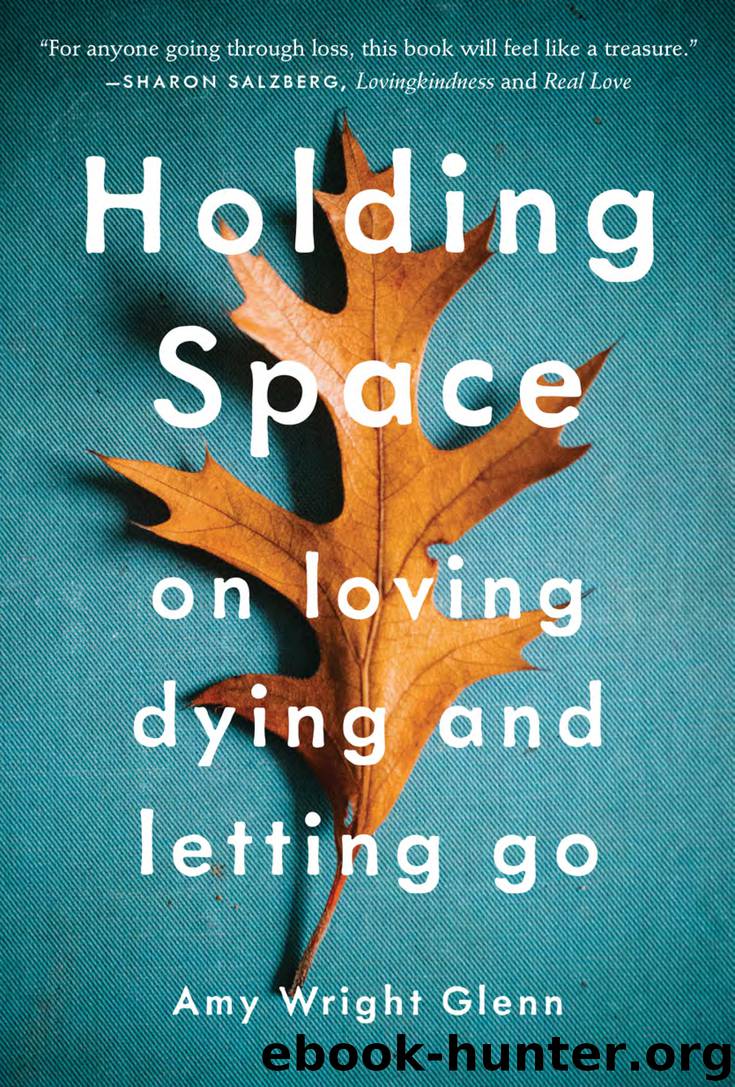Holding Space by Amy Wright Glenn

Author:Amy Wright Glenn
Language: eng
Format: epub
Publisher: Parallax Press
Published: 2017-11-13T16:00:00+00:00
eight
you make me brave
“Once upon a time, stillborn babies were whisked away and the parents didn’t even see them. But now hospitals have changed their practices, and parents can have and hold their stillborn babies, to say good-bye.
No one seems to have thought of the fact that first the parents have to say hello.”
—ELIZABETH HEINEMAN
My breasts.
My breasts are what I remember most about the last time I was pregnant. They were so full and fertile. I smiled with the secret wonder of a new life growing within my womb. I imagined my son holding a newborn brother or sister. One afternoon, Taber and I went to the beach to swim. My breasts easily filled out the top of my blue bikini. As waves washed over me, I remembered that faint line on the pregnancy test stick, signifying success.
Yes! Pregnant.
But the joy didn’t last.
It wasn’t long before my breasts had returned to their regular size and blood filled the pads between my legs. It was an early miscarriage.
I’ve had a handful of early miscarriages over the course of the years prior to, and following, Taber’s birth. Each one, a loss. As I watched dark, swirling red blood fill the bottom of the toilet bowl, I wrapped my arms around my stomach and wept.
My own experience of moving through the cycles of hoping, longing, and grieving add a personal dimension to the trainings I lead on pregnancy loss. “I wish people knew how much it’s possible to miss a person you have never met, and to mark time by their absence,” wrote a bereaved mother who contributed to a National Public Radio segment about miscarriage.
I understand this missing. I understand the stark absence of a hoped-for child.
Dr. Kristen Swanson, professor at the College of Nursing at Seattle University, has studied pregnancy loss for nearly thirty years. She has worked diligently to bridge the tremendous gap between the terminology used by medical professionals to describe pregnancy loss and the language used by bereaved mothers who open up about their experience. Consider the difference between “products of conception” and “my baby.” The chasm is great.
Swanson also helps to normalize the frequent occurrence of pregnancy loss—not to diminish the grief, but to educate the general population about the basic facts, especially regarding miscarriage. Consider that most Americans believe miscarriage occurs in approximately one in twenty pregnancies. The reality is that miscarriage occurs in one of every four or five pregnancies.
Most important, when it comes to holding space for the experience of pregnancy loss, Swanson listens.
“What is it like?”
“What made you feel cared for?”
These questions inspire the framework of Swanson’s “Theory of Caring,” developed to help medical professionals serve the bereaved families they care for with more nuance and kindness. For example, rather than focusing on the potential for future successful and viable pregnancies to distract a woman from grieving an early loss, Swanson encourages medical professionals to affirm the belief that women have the strength to work through and integrate the experience of loss. She
Download
This site does not store any files on its server. We only index and link to content provided by other sites. Please contact the content providers to delete copyright contents if any and email us, we'll remove relevant links or contents immediately.
| Grief & Bereavement | Hospice Care |
| Pet Loss | Suicide |
They Both Die at the End by Adam Silvera(8610)
Thirteen Reasons Why by Jay Asher(7788)
The Space Between by Michelle L. Teichman(6087)
Suicide Notes by Michael Thomas Ford(4272)
Tuesdays with Morrie by Mitch Albom(3832)
Suicide: A Study in Sociology by Emile Durkheim(2609)
The Checklist Manifesto by Atul Gawande(2202)
Tuesdays With Morrie by Mitch Albom(2172)
Robin by Dave Itzkoff(2005)
In the Woods by Tana French(1996)
Bossypants by Tina Fey(1987)
No Ashes in the Fire by Darnell L Moore(1981)
Reservoir 13 by Jon McGregor(1852)
End of Days by Sylvia Browne(1822)
Olive Kitteridge by Elizabeth Strout(1790)
Bus on Jaffa Road by Mike Kelly(1783)
All Things New by John Eldredge(1781)
Scar Tissue by Anthony Kiedis(1769)
No Time to Say Goodbye(1759)
